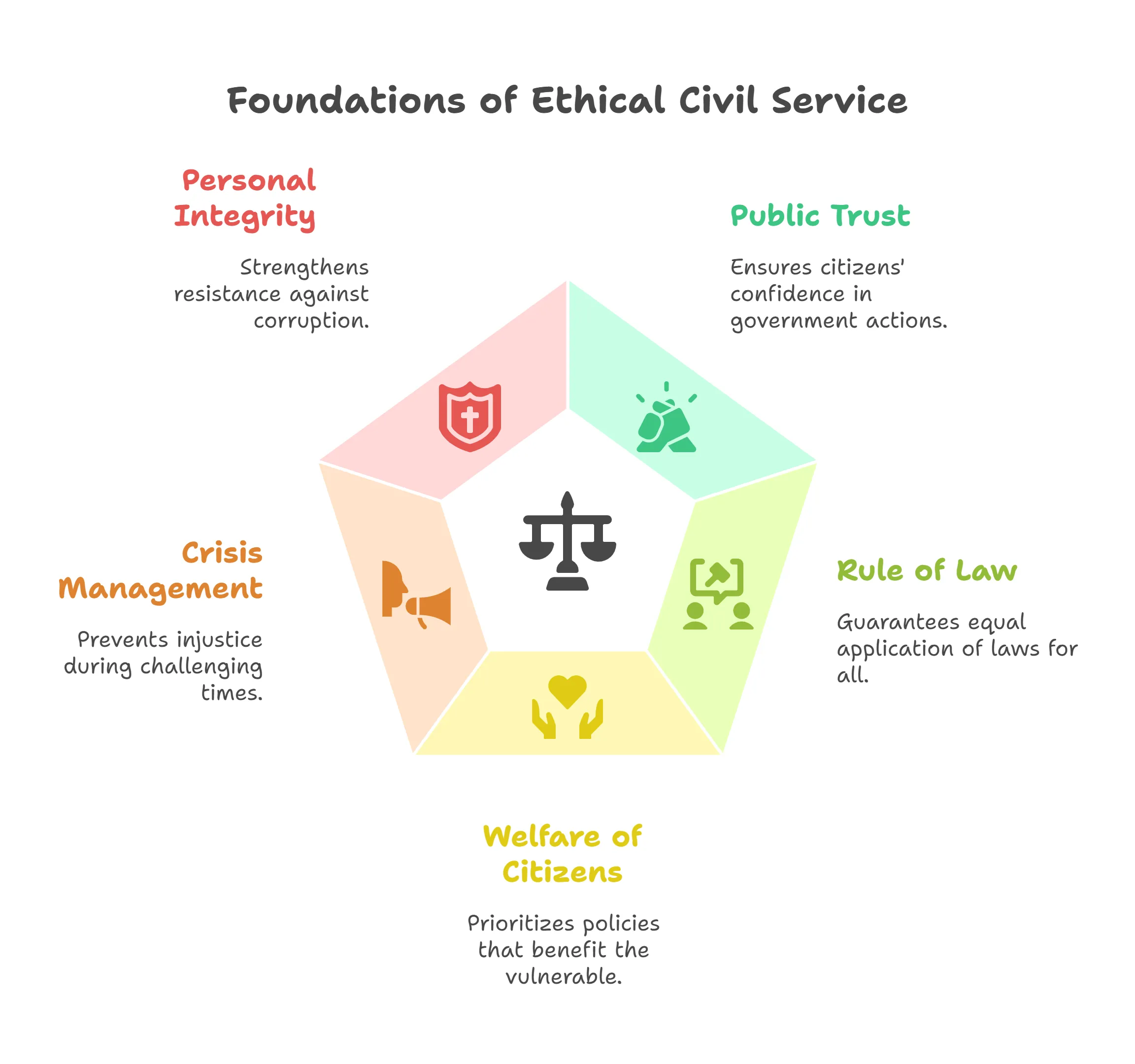Ethics and Human Values in Public Administration
Ethics and human values form the foundation of a civilized society. For Civil service aspirants, understanding ethics is not just about clearing General Studies Paper IV (Ethics, Integrity and Aptitude) but also about becoming a responsible civil servant who serves the people with honesty, fairness, and compassion.
The civil services are not only about administration and power; they are also about moral responsibility. An officer’s decisions can affect thousands, sometimes millions, of lives. Therefore, ethics and values act as guiding lights to help officers make the right choices, even when the path is difficult.
What are Ethics?
The word ethics comes from the Greek word ethikos, meaning character. Ethics can be defined as the principles of right and wrong that guide human conduct.
In simple words:
Example:
- If a government officer finds a file that has been wrongly approved due to corruption, ethics demand that the officer refuses to sign it, even if pressured by political leaders.
- Ethics is not just about following laws, but also about following conscience.
What are Human Values?
Values are deeply held beliefs that guide our behaviour and decisions. Human values are those qualities that define what it means to be truly human. Some of the human values and sub-values include:
1) Right-Conduct
2) Peace
3) Truth
4) Manners
5) Patience
6) Truthfulness
7) Awareness
8) Concentration
9) Honesty
10) Responsibility
11) Positive
12) Fairness
13) Independence
14) Self-acceptance
15) Trust
16) Perseverance
17) Self-discipline
18) Reflection
19) Courage
20) Contentment
21) Determination
22) Love
23) Non-violence
24) Kindness
25) Consideration
26) Forgiveness
27) Stewardship
28) Generosity
29) Justice
30) Compassion
31) Respect
32) Tolerance
33) Cooperation
34) Service
35) Harmlessness
Example:
- A doctor who treats poor patients free of cost shows the value of compassion.
- A teacher who ensures all students get equal attention shows the value of justice and fairness.
Difference Between Ethics and Values
Although ethics and values are closely related, they are not the same.
| Aspect | Ethics | Values |
|---|---|---|
| Definition | Principles of right and wrong | Beliefs about what is important in life |
| Source | External (society, laws, professional code) | Internal (personal belief system) |
| Flexibility | Relatively universal | Can differ from person to person |
| Example | Corruption is unethical | Honesty is a personal value |
👉 Ethics are like rules of the game, while values are the inner motivation that makes you play fair.
Importance of Ethics and Values for Civil Services
A civil servant’s power must always be balanced with responsibility. Without ethics and values, power can easily turn into corruption or misuse.
Key reasons why ethics and values matter in civil services:
- Public Trust: People trust civil servants to act fairly.
- Rule of Law: Ethical officers ensure laws are applied equally to all.
- Welfare of Citizens: Values like empathy and compassion ensure policies benefit the poor and marginalized.
- Crisis Management: During tough times, ethical decision-making prevents injustice.
- Personal Integrity: Helps officers resist corruption and political pressure.

Ethical Dilemmas in Administration
Civil servants often face situations where there is no clear “right” or “wrong.” These are called ethical dilemmas.
Example 1:
A poor woman asks for a Below Poverty Line (BPL) card but does not meet the official criteria. Should the officer give her the card out of compassion, or strictly follow the rules?
👉 This is a clash between compassion and justice/fairness.
Example 2:
An officer is asked to transfer a teacher who is performing very well, just because of political pressure. Should the officer follow the politician’s order or protect the teacher’s contribution?
👉 This is a clash between loyalty to superiors and duty to society.
Ethics help officers resolve such dilemmas with fairness, courage, and integrity.
Sources of Ethics and Human Values
Our ethics and values come from many sources:
- Family: First school of values (honesty, respect, kindness).
- Society: Cultural traditions, customs, and role models.
- Education: Teachers and books shape our sense of justice and fairness.
- Religion and Philosophy: Teach compassion, truth, and non-violence.
- Constitution: Fundamental rights and duties provide ethical guidance for governance.
- Professional Codes: Civil services conduct rules, laws, and regulations.
Core Values for Civil Servants (with Examples)
- Integrity:
- Doing the right thing even when no one is watching.
- Example: Refusing bribes, even if it means losing a promotion.
- Objectivity:
- Making decisions based on facts, not personal bias.
- Example: Selecting candidates for a government scheme purely on merit.
- Empathy:
- Understanding people’s pain and acting to reduce it.
- Example: During floods, arranging food and shelter for affected families before paperwork.
- Transparency:
- Openness in decision-making.
- Example: Publishing tender details online to prevent corruption.
- Accountability:
- Taking responsibility for one’s decisions.
- Example: Accepting responsibility for delays in service delivery.
- Courage of Conviction:
- Standing up for what is right, even under pressure.
- Example: An officer refusing to clear an illegal land deal despite threats.
- Compassion:
- Treating citizens with kindness.
- Example: Listening patiently to a poor farmer’s grievance instead of dismissing him rudely.
Case Studies for Better Understanding
Case Study 1: Integrity
An officer discovers that his senior is approving contracts that benefit his relatives. If he reports it, he risks his career. If he stays silent, public money is wasted.
👉 Ethical action: Report the issue through proper legal channels. Integrity demands loyalty to the people, not corrupt individuals.
Case Study 2: Empathy and Compassion
During the COVID-19 lockdown, migrant workers were stranded without food. A district collector arranged buses, food camps, and helplines.
👉 Ethical action: Compassion + Responsibility saved lives.
Case Study 3: Transparency
In a rural development scheme, tenders were awarded secretly. One ethical officer uploaded all details online and invited public scrutiny.
👉 Ethical action: Transparency reduced corruption.
Role of Ethics in Civil Service Preparation
For aspirants, ethics is not just a subject to study but a value system to live by.
- In Studies: Honesty in preparation (no shortcuts like cheating in mock tests).
- In Life: Treating fellow aspirants with respect and cooperation.
- In Exam: Writing ethical, balanced answers with real-life examples.
👉 UPSC does not just want intelligent officers; it wants officers with character.
Practical Tips to Develop Ethics and Values
- Self-reflection: Ask yourself daily – “Did I act fairly today?”
- Role Models: Read about leaders like Mahatma Gandhi, APJ Abdul Kalam, Sardar Vallabhbhai Patel.
- Real-life Practice: Help someone without expecting anything in return.
- Case Study Practice: Solve UPSC previous year ethics case studies.
- Follow Constitution: Understand values in the Preamble (justice, liberty, equality, fraternity).
Conclusion
Ethics and human values are the backbone of good governance. For Civil Service aspirants, learning ethics is not about memorizing definitions but about living those values in daily life.
A civil servant with knowledge but no values can become a danger to society, while a civil servant with ethics and compassion becomes a true servant of the people.
Therefore, as you prepare for Civil Service, remember:
- Knowledge will make you capable,
- But ethics and values will make you trustworthy and respected.

